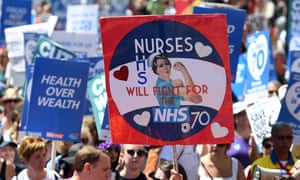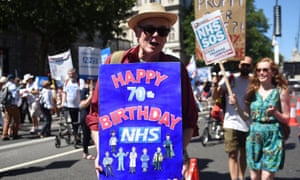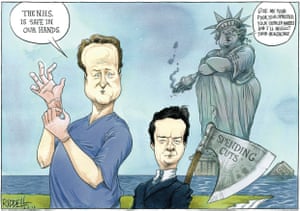
People march through London yesterday to mark 70 years of the NHS.
Gatekeeping has become a watchword within our public services over the past seven years. It’s being driven by the government’s deep affection for neoliberal dogma, the drive for never-ending ‘efficiency savings’ and the Conservatives’ lean, mean austerity machine. Perish the thought that the public may actually need to use the public services that they have funded through their contributions to the Treasury, in good faith.
In the NHS, even the resource gatekeepers have gatekeepers, those receptionists standing sentry at the end of the telephone, and in general practices, who ration access to the GPs so assiduously we patients often get better before we’ve managed to arrange an appointment. Or ended up at an Accident and Emergency Department.
Only a service dedicated to keeping the public and service providers apart could have devised a system so utterly demeaning. It turns patients into supplicants and receptionists into bouncers who make decisions they are unlikely to be qualified to make, neither being roles to which any of us aspired.
Now, it has been decided that the NHS needs to scrap more medical procedures, including injections for back pain, surgery to help snorers and knee arthroscopies for arthritis, which form part of an initial list of 17 operations that will be discontinued completely or highly restricted by NHS England as many of these problems “get better without treatment.”
I can assure you that arthritis of the knee, or anywhere else for that matter, doesn’t tend to get better. Medical interventions can help patients with ‘managing’ the condition, however.
Varicose vein surgery and tonsil removal also feature on the list of routine operations to be axed as part of NHS England’s drive to cease “outdated” and “ineffective” treatments.
The latest round of rationing is hoped to save £200m a year by reducing “risky” or “unnecessary” procedures. Patients are to be told they have a responsibility to the NHS not to request “useless treatment.”
However, complications from varicose veins, for example, include leg ulcers which require more costly specialist treatment to help them heal.
Steve Powis, the medical director of NHS England, said: “I’m confident there is more to be done”, adding that the list of 17 operations formed “the first stage” of rooting out futile treatments that are believed to cost taxpayers £2bn a year.
“We are also going to ask ‘Are there other procedures and treatments we should add to the list?’. Additions could include general anaesthetics for hip and shoulder dislocations and brain scans for patients with migraines.
Hip and shoulder dislocations are notoriously excruciating, as is the process of having the joint relocated, though the latter is short-lived. It’s particularly brutal to leave patients without pain relief, and especially children.
The reason why brain scans are often very important when people develop migraine symptoms is that they can determine whether the severe headaches are caused by something more serious, such as a subarachnoid haemorrhage (which happened to me) or a tumour (which happened to my mother). Sometimes ‘migraines’ are something else.
Powis added: “We have to spend taxpayers’ money wisely. Therefore, if we are spending money on procedures that are not effective, that is money we could spend on new treatments that are clinically effective and would provide benefits to patients. It’s absolutely correct that, in getting more efficient, one component of that is to make sure we are not undertaking unnecessary procedures.”
The rationing comes as the government prepares to raise taxes and ditch an increase to the personal income tax allowance to pay for NHS funding plans. According to proposals, £20.5bn of extra funding would be set aside for the health service by 2023. In a speech at the Royal Free hospital in London a fortnight ago, Theresa May said tax rises were inevitable.
However, there doesn’t seem to be any indication that this additional measure will ensure the public has value and adequate health care for their money.
The prime minister said: “As a country, taxpayers will need to contribute a bit more.But we will do that in a fair and balanced way. And we want to listen to people about how we do that, and the chancellor will bring forward the full set of proposals before the spending review.”
Here are the 17 treatments NHS England may axe
Four procedures will only be offered at the request of a patient:
- Snoring surgery
- Dilation and curettage for heavy menstrual bleeding
- Knee arthroscopies for osteoarthritis
- Injections for non-specific back pain
A further 13 treatments will only be offered when certain conditions are met:
- Breast reduction
- Removal of benign skin lesions
- Grommets for glue ear
- Tonsillectomy
- Haemorrhoid surgery
- Hysterectomy for heavy menstrual bleeding
- Removal of lesions on eyelids
- Removal of bone spurs for shoulder pain
- Carpal tunnel syndrome release
- Dupuytren’s contracture release
- Excision of small, non cancerous lumps on the wrist called ganglia
- Trigger finger release
- Varicose vein surgery
Some of these procedures do improve the quality of people’s lives. I’m wondering how this sits with the government’s drive to push people with disabilities and medical conditions into work.
Although it was announced recently that the NHS is to hire 300 employment coaches to find patients jobs to “keep them out of hospital.” It’s what the government probably calls the ‘two birds and one bullet’ approach.

Yesterday, tens of thousands of people marched through London to mark the NHS’s 70th anniversary and demand an end to government cuts and further privatisation of the health service. Bearing placards reading “Cuts leave scars”, “For people not profit” and “Democracy or corporate power” demonstrators moved down Whitehall on Saturday afternoon to the chant of “Whose NHS? Our NHS”.
The protesters stopped outside Downing Street to demand Theresa May’s resignation en route to the stage where they were greeted by a choir singing “the NHS needs saving, don’t let them break it”. Shortly after, Jeremy Corbyn addressed the crowd – organisers said there were about 40,000 people present – demanding an end to privatisation, the closure of the internal market, for staff to no longer be subcontracted to private companies and for social care to be properly funded.
Corbyn said: “There have been huge attacks on our NHS over many years,” he said. “The Tories voted against the original legislation and have always sought to privatise it and continue an internal market.
“Paying money out to private health contractors, the profits of which could and sometimes do, end up in tax havens around the world.
“Think it through, you and I pay our taxes because we want a health service for everybody, I don’t pay my taxes for someone to rip off the public and squirrel the profits away.”
I absolutely agree.
A brief history of the travailing NHS under Conservative governments
The government has failed to adequately fund the NHS since taking office as part of the coalition in 2010, and has overseen a decline in the once widely admired public health service, as a way to privatise it by stealth.
The Tories have utilised a spin technique that carry Thatcher’s fingerprints – it’s called ‘don’t show your hand.’

Jeremy Hunt and the Conservatives insist the NHS is ‘safe in our hands’

The direction of travel was set 25 years ago by the NHS review announced by Margaret Thatcher on the BBC Panorama programme in January 1988. The Conservatives have a poor track record with the NHS. Thatcher ushered in the NHS internal market, the mechanism that introduced what many in the health service still revile: competition.
Health authorities ceased to run hospitals but instead “purchased” care from hospitals who had to compete with others to provide it and became independent, self-governing trusts. The stated aim was to ‘increase efficiency’ and ‘eliminate waste’ through competition. Yet by the time John Major was prime minister, we saw the crisis deepen, with the postcode lottery and patients parked on hospital trolleys in hospital corridors for hours on end, waiting to see a worn out, overworked doctor.
In order to assess the impact of Thatcher’s legacy on healthcare, it’s essential to appreciate that NHS market reforms began on her watch. Even the apparently relatively minor step of outsourcing hospital cleaning services was to cast a dark shadow over hospital care decades later. Putting cleaning services out to competitive tender meant that the job of cleaning wards went to the lowest bidder – often to companies that used casual, untrained staff, supplied by job centres. The contrast between the high quality of surgical treatment and the dirtiness of wards became notorious. The level of hospital-acquired infections grew steadily, including those caused by ‘superbugs’ including MRSA.
A study published by the Health Service Journal laid the blame for the rise of antibiotic resistant infections on poor hygiene standards; finding hospitals full of rubbish, uncollected left-over food in canteens and dirty linen strewn over bedroom floors. The impact outsourcing has had on cleaning services has been a constant source of tension since those early reforms. While trade unions and medical professionals have consistently argued against it, business leaders have always rejected any connection between outsourcing, infection rates, and declining standards.
Public sector outsourcing is central to the present government’s ideological strategy, despite the evidence that is now stacked against it being genuinely ‘competitive’. Since 2010, the number of large contracts awarded has increased by over 47% with tens of thousands of workers in various sectors – health, defence and IT – being transferred to corporate employers like Serco, Capita and G4S. The UK’s public sector has become the largest outsourcing market in the world, accounting for around 80% of all public sector contracting in Europe. These multinationals are not particularly interested in competition; they’re interested in profit and being in a monopoly position where they can dominate the market. Despite the wake of scandals that follows these companies, growth in the public sector outsourcing market shows no signs of slowing and the government shows no signs of learning from these events.
Thatcher wanted to introduce even more radical changes – such as a shift to an insurance based healthcare model, with ‘health stamps’ for the poor – but in a busy decade, it seems that her battles with trade unions and left-wing Labour councils took priority.
It was under Thatcher’s administration that the climate of austerity began within the NHS.
Then there was the Black Report into health inequalities, published in 1980 after a failed attempt by the Conservatives to block its publication, noted that health inequalities in the UK were linked to socio-economic factors such as income, housing and conditions of work. The government rejected the report’s findings and recommendations.
Conservatives published a policy book called Direct Democracy in 2005. It claimed that the NHS was “no longer relevant”, and a system was proposed whereby patients were funded “either through the tax system or by way of universal insurance, to purchase health care from the provider of their choice” – with the poor having their contributions “supplemented or paid for by the state”. The authors included the current health secretary Jeremy Hunt.
Against a backdrop of austerity and public cuts, healthcare facilities are continuing to contract out their facilities management and clinical services. But, the practice remains deeply controversial and the consequences are becoming more visible.
Thatcher’s competitive tendering was introduced for cleaning, catering and other ancillary non-medical services, and were extended by the Tories in the ’90s under the NHS and Community Care Act – the first piece of legislation to introduce an internal market into the provision of healthcare. This was followed by the Private Finance Initiative (PFIs) in 1992 under the Major government. Lansley’s reforms – premised on ‘increasing the diversity of providers in the management of the NHS’ – represent only the culmination of this legacy.
A centrally funded health service has demonstrated its a major contribution to reducing health inequality, by permitting healthcare practitioners and policy makers to design services and deliver care based on need, not the profit incentive. An increasingly privatised NHS has simply led to rationing and inadequate healthcare.
The biggest single contribution to health inequality is social inequality, a problem that has deteriorated significantly in the wake of the Conservative agenda of combined economic austerity and welfare reform.

Image courtesy of Robert Livingstone
Related
The Coalition has deliberately financially trashed the NHS to justify its privatisation
Rogue company Unum’s profiteering hand in the government’s work, health and disability green paper
Labour challenge government about ‘shocking’ rise in coroner warnings over NHS patient deaths
I don’t make any money from my work. I am disabled and don’t have any paid employment. But you can contribute by making a donation and help me continue to research and write informative, insightful and independent articles, and to provide support to others. The smallest amount is much appreciated – thank you.



Treatments should not be proscribed for non medical reasons. Heavy bleeding causes anaemia, bone spurs whic cause shoulder pain result in reduced mobility. You could make a different list with equal validity, gastric bands for obesity, infertility treatments, and so on. I suggest the list is political, in the sense of choosing targets which will on a casual glance seem ok. I was recently treated (not in U.K.) for a broken, displaced hip. If dislocation is as painful as this I can’t imagine how anyone could suggest not using anaesthetic, and surely the choice should be governed by the medical assessment of the patient.
LikeLiked by 2 people
itll be back to chloroform next or worse still getting people drunk so they (assumedly) dont feel their leg being sawn off/ from pictures i have seen during my nurse training re the history of medicine it didnt look to me like the man enduring that operation was enjoying it. drunk or not.he looked to be in agony.
now…what follows is not saying i dont believe things are bad in hospitals.. on the contrary…. but last weds i had occasion to go to our local A& E department having ripped the 3 layers of skin off the back of my hand on a protruding nail. on arrival i saw the registration clerk in a matter of minutes. told to sit and wait, which i did, noticing a kind of light box which told you how long you could be waiting to see a Dr. (in this instance 2hrs 28mins) and how many patients were waiting …….19…i looked around and saw only about 6 at most. ok. “wonder where the other 13 are?” thinks I. dismissing it as maybe outside having a cigarette or already in cubicles waiting the next phase of the routine. ok. i set to reading a small booklet i had in my bag thinking i might as well if im going to be waiting so long. first paragraph of 6 lines and i was called in. a lovely male nurse practitioner who assessed the damage (yes it needed stitches but its not a good idea on back of hands so 12 or so sterri-strips, a piece of inidine gauze, square of normal gauze and a light bandage later i was done (10 minutes ..possibly 15) from walking in the door to walking out again and still very few others around in the waiting area. i had asked the nurse about the lack of countable bodies in the waiting area and did they really have patients laying on trollies in the corridors. answer was… only when they had no beds and my guess had been right about hardly any one waiting..but as an ex nurse who spent part of her training on A&E back in the early 60’s and seen waiting rooms brimming over and knew Leeds infirmary at one point had beds down centre of wards as well as each side, you can imagine that now I feel a tad confused. I’ve heard so much about whats happening to the NHS and i am a strong Labour supporter so really do not want to distrust any of what i have heard but this experience does make you wonder. admitted was a red hot day, not middle of winter which i suppose makes a big difference. but what are the experiences of others in their local hospitals?
LikeLiked by 2 people
I’ve ben left on a trolley in a corridor after being taken to A & E following a seizure. The corridor was full – many elderly people, one lady was in agony as she’d had a prolapse, and she also suffered from Alzheimers anddidn’t understand what had happeneed to her. She was there at least 1 hour, so was I.
Last time I was at the hospital I was in septic shock through pneumonia, I was seen immediately and I remember being very carefully monitored in between all the tests and lung x ray. But there was no room in the ICU, and I spent half the night in a room on my own, though I had round the clock care, with drips and slow injections, BP, temp, oxygen therapy and so on.
LikeLike
Not a lot likely I’ll come across more .. Here’s the first newspaper article https://www.independent.co.uk/news/health/nhs-world-ranking-uk-healthcare-worse-ireland-spain-slovenia-30th-lancet-a7744131.html https://www.thelancet.com/journals/lancet/article/PIIS0140-6736(17)30818-8/fulltex The Kings Fund “Although the UK’s performance against international benchmarks of health care quality is variable, British people rate the quality of their health care highly, and most are satisfied with the NHS overall. However, in a global online survey of public opinion, 47 per cent of British respondents thought quality would get worse over the next few years, making them the most pessimistic of the 23 countries surveyed.” https://www.kingsfund.org.uk/publications/articles/big-election-questions-nhs-international-comparisons
LikeLiked by 1 person
Jeremy Corbyn is set to claim there is mounting evidence austerity and inequality are “killing people”, in a speech marking the 70th anniversary of the creation of the NHS.
Pledging to “declare war” on health inequality, the Labour leader will also promise to increase funding for the overstretched health service and launch a “national mission” to confront causes of ill health and deprivation.
It comes after Mr Corbyn joined thousands marching through London on Saturday, demonstrating against “deliberate” underfunding of services, nurses and health staff that has “pushed our NHS to the brink”.
https://www.independent.co.uk/news/uk/politics/jeremy-corbyn-mounting-evidence-austerity-is-killing-people-government-cuts-labour-welfare-a8424381.html
LikeLiked by 1 person
Over the last two or three weeks, I’ve heard it said that the UK has the worst health service, and he lowest state pensions in the whole EU. Have you any idea whether these statements are true? Can they possibly _be_ true?? I can accept that things are most probably better in parts of northern Europe where they seem to think that the state should take care of its citizens, but the UK worse even than places like Greece and Portugal, not to mention all the former eastern block EU members. Does anyone have any reliable figures?
LikeLike
Reblogged this on circusbuoy.
LikeLike
Reblogged this on Declaration Of Opinion.
LikeLike
Kitty.this is what i was getting at. your experience i know is similar to experiences of a lot of people. thats why i was so taken aback at how quickly i was seen and the nurse practitioners expertise was faultless. but the near empty waiting room i was shocked at because i had fully expected to see it heaving..i have never seen it almost empty on any occasion i have landed up going there in the past either for myself or with someone else.perhaps the blazing hot weather had something to do with it. (well you never know do you?the weather gets blamed for everything these days.)
LikeLiked by 1 person
Reblogged this on Worldtruth.
LikeLike
Have you seen this?
“State Crime By Proxy: corporate influence on state sanctioned social harm”
http://truepublica.org.uk/united-kingdom/research-paper-state-crime-by-proxy-corporate-influence-on-state-sanctioned-social-harm/
LikeLiked by 1 person
Reblogged this on seachranaidhe1.
LikeLike
Reblogged this on michaelsnaith.
LikeLike
I have developed a large filo-form Wart which is hanging down from the inside of my nose.
After trying various treatments to get rid of it and failing I went back to GP as the hospital had advised I would be eligible to have it surgically removed.
My GP applied for special funding and I got the decision back from her yesterday.
Note. it is my GP who applies for the funding on my behalf.
Have typed the relevant paras from the letter the CCG sent my GP below..
The CCG has clinical criteria that must be satisfied for patients requiring this procedure…….
we are unable to agree to funding as the evidence provided does not demonstrate that the required criteria have been met.
It then drivvels on about exceptional Funding Request panel meetings etc…..
followed by:
BaNES CCG requires the following to be demonstrated to fund any treatments/procedures under exceptional circumstances: (here comes the Orwellian twist…)
“The patient is significantly different to the general population of patients with the condition in question and…
The patient is likely to gain significantly more benefit from the intervention than might be normally expected for a patient with that condition.
The fact that a treatment is likely to be effective for a patient is not, in itself, a basis for exceptionality.”
I have been advised that I could make a case as I am a cellist and perform solo etc. But this just seems plain discriminatory to me.
How is their criteria clinical in any way? It appears to me to be based on prejudice and wholly subjective.
~As for the use of scientific language such as “significant difference” etc. its deceitful. Gives the illusion of science when their criteria appears to me to be irrational and un-quantifiable!
No doubt this obfuscational style of language is there by design. to confuse and make things opaque.
Putting people off questioning decisions.
So appears unless I go private (think thats the end game here), I shall have to suffer the consequences of being stared at constantly by people who at first glance see something unsightly hanging from my nose which could easily resemble a large bogey!
LikeLike
Just a quick one for you Kitty
UN Special Rapporteur invites contributions from individuals & organisations working on issues related poverty human rights incl representatives of civil society organisations experts academics to provide input for preparation of his visit November 2018 https://shar.es/a13EH6
LikeLike
Really good article Kitty the Tories have nothing but bad intent for the NHS. In my blog I’ve been uncovering the horror show which is thew Tory management of the NHS. Please have a look if you can https://wordpress.com/post/jcashbyblog.wordpress.com
LikeLiked by 1 person
Too dim to figure out how to find you kitty will check twitter just wanted you to see this
Universal credit IT system ‘broken’, whistleblowers say
Service centre staff say glitches having harmful effect on huge number of claimants
Case studies: ‘It was more about getting them off the phone’
https://www.theguardian.com/society/2018/jul/22/universal-credit-it-system-broken-service-centre-whistleblowers-say
Liz
LikeLike
This is gold. I absolutely love this. Passion bleeds off the page as much as common sense. Brilliant
LikeLiked by 1 person